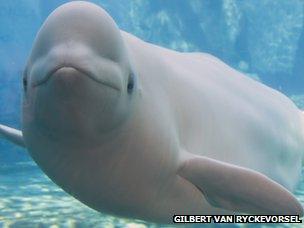Cat parasite found in Arctic Beluga
- Published

Fourteen percent of the tested whales were carrying the infection
The cat parasite Toxoplasma gondii, which can cause blindness in people, has been identified in Beluga in the western Arctic.
The discovery by University of British Columbia scientists has prompted a health advisory to Inuit people in the region who eat the whale's meat.
Researchers say it is an example of how the warming of the Arctic is allowing the freer movement of pathogens.
Icier conditions in the past acted as an obstruction to infectious agents.
“Ice is a significant ecological barrier and it influences the way in which pathogens can be transmitted in nature and your risk of exposure,” said molecular parasitologist Michael Grigg.
“What we’re finding with the changes ongoing in the Arctic is that we’re getting new pathogens emerging to cause diseases in the region that haven’t been there before,” he told BBC News.
The UBC Marine Mammal Research Unit, external scientist was speaking here at the annual meeting of the American Association for the Advancement of Science (AAAS).
Toxoplasma gondii is ubiquitous at lower latitudes, and many people carry it with no ill effects. But it is a danger to pregnant women and individuals with weak immune systems.
Dr Michael Grigg: "We knew it was in the land mammals of the Arctic"
The fact that it is now prevalent in beluga is significant because Inuit will often eat the meat raw or undercooked - something they are now being strongly discouraged from doing.
Quite how the parasite got into the whales is a puzzle that scientists are now trying to solve.
They suspect the influx of cats to the Arctic brought in as pets will have imported the pathogen.
The contents of their faeces will somehow have got into watercourses and then been washed into the ocean. And with the significantly warmer temperatures in the Arctic now, liquid water is mobile for longer.

The danger comes from eating undercooked or raw Beluga whale meat
"The transmissible stage of this parasite is an egg-like structure," said Dr Grigg.
"The only way to deactivate it is to boil it or freeze it, so the longer you have temperatures above zero degrees Celsius, the more risk you have in being exposed to this infectious stage of the parasite. And with climate change, you are increasing your risk."
In 2012, Dr Grigg's UBC team showed that a new strain of another parasite, Sarcocystis, was responsible for killing more than 400 grey seals in the North Atlantic. This pathogen had previously been seen only in the Arctic.
Dr Grigg said this was an example of the warming conditions opening up the region to allow more southerly populations of sea mammals to mix with their northern neighbours, and so become exposed to pathogens they would not normally experience.
Dr Sue Moore, an oceanographer with the National Oceanic and Atmospheric Administration, said keeping an eye on sea mammals was one of the best ways to monitor changes in the Arctic. She called them "sentinels of change".
"They’re the top predators and so they rely on the ecosystem in which they live; they have a top-down view," she told BBC News.
"They reflect the changes that are occurring below them. They may not be able to tell you every linkage, but if a sea mammal stops eating one thing and starts eating another, that tells me there has been a big shift."
Jonathan.Amos-INTERNET@bbc.co.uk and follow me on Twitter: @BBCAmos, external
- Published3 February 2014
- Published30 July 2013
- Published22 October 2012